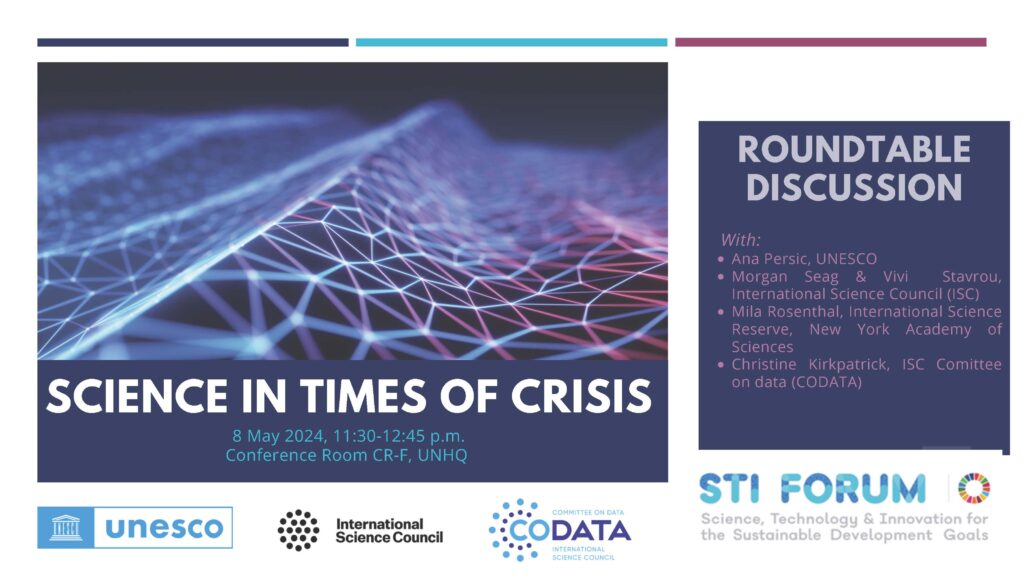Science in Times of Crisis:
Protecting Scientific Resources and Using the UNESCO Open Science Framework for Sharing Data and Knowledge in Times of Crisis
This roundtable discussion took place on 8 May 2024, 11:30-12:45 p.m. in Conference Room CR-F, UNHQ, New York. Panellists were:
- Ana Persic, UNESCO
- Morgan Seag and Vivi Stavrou, International Science Council (ISC)
- Mila Rosenthal, International Science Reserve, New York Academy of Sciences
- Christine Kirkpatrick, ISC Committee on Data (CODATA)
The Sustainable Development Goals cannot be achieved without everyone sharing the advancement and benefits of science, as reflected in Article 27 of the Universal Declaration of Human Rights. This is even more relevant in times of crisis, when science needs to be protected, and access to science needs to be openly available to all societal actors.
Crises, including disasters and health emergencies on a large scale, exact a heavy toll on the safety and well-being of persons, communities, and countries. Over recent years, evidence indicates that the impact of crises on persons and assets, including those related to science, in all countries has increased faster than vulnerability has decreased.
Open Science is a strategic movement initiated to democratise processes and outcomes of scientific research for sustainable development, equality and inclusiveness. Its open, inclusive and collaborative methods contribute to new governance models around scientific data, taking fullest advantage of the proliferation of data, the instantaneous nature of communications, and digitalisation of knowledge storage systems.
Recognising the 2021 UNESCO Recommendation on Open Science as a robust international framework for open science, the UNESCO-CODATA Working Group on Data Policy in Times of Crisis has investigated recent pandemics/epidemics, natural hazards, and geopolitical conflicts and pointed to the need for increased data comprehensiveness, integrity, and transparency, alongside more robust ethics and scientific frameworks supporting data policies, methods, and tools for addressing crisis situations.
At the same time, with many conflicts spread over vast geographical zones, increasing extreme weather events due to climate change, and natural hazards such as earthquakes in unprepared regions, the new study of the ISC’s think tank, The Centre for Science Futures, addresses the urgent need for a new approach to safeguard science and its practitioners during global crises.
In this context, this event discussed new approaches to safeguard science and its practitioners during global crises, and it also reflected on new developments in mobilising science and sharing data in times of crisis within the open science framework.
This page last reviewed: 2024-11-07.

